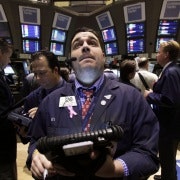Silver linings in a carbon credit crash
April has dawned with both clean energy share prices and European Union carbon credits languishing at, or near, multi-year lows. Investors are being left to wonder whether the rest of 2012 will reveal silver linings to these clouds.
On Monday, EU Allowances for December 2012 expiry fell to a record low of €6.14 per tonne of CO2, before edging back to €6.34, down 80 cents on the day.
Meanwhile, on the stock market, the WilderHill New Energy Global Innovation Index, or NEX, which tracks the fortunes of 97 clean energy stocks worldwide, slipped to 135.55 at the close on Monday, from 140.1 a week earlier. Its latest level was just a dozen or so points above its eight-year low of 122.57 reached last December.
In the first quarter of 2012, the NEX gained 4.2 per cent – but this compared to a much more impressive 11.8 per cent surge for the broad-based US S&P 500 index.
Worse, there continue to be casualties among quoted clean energy stocks. On Monday this week, US units of Solar Millennium, the German solar thermal electricity generation specialist, filed for bankruptcy protection. The parent company is already in insolvency proceedings in its home country. Also on Monday, Q-Cells, one of the pioneering German PV manufacturers, saw its shares plunge 41 per cent after it said that it was "legally bound to file for insolvency".
So, what of the possible silver linings? On the carbon price, Monday's sharp drop was caused by news that emissions from factories and power stations in the EU fell by more than expected in 2011. They decreased to 1.7 billion tonnes in 2011 from 1.75 billion for the same installations in 2010, according to preliminary data published on Monday on the EU website and compiled by Bloomberg New Energy Finance.
This decline reflected the economic problems of the EU member countries. These sent power demand down 4 per cent last year. Since power sector emissions across the EU fell by 32Mt, or 2.9 per cent, from 2010 to 2011, the emissions intensity of power rose slightly overall, but this was mostly as a result of a drop in nuclear and hydro power production. When looking at thermal power generation in isolation, the emissions intensity actually dropped by 0.7 per cent as more efficient coal and gas power stations replaced the output from older plants.
Lower emissions might be good news for the environment on the face of it, but depressed carbon prices mean less incentive for industries to curb emissions further. Analysts expect the weakness of the EU carbon price to lead European lawmakers to introduce a "set-aside" program to withhold permits from the market. This would boost carbon prices and increase the incentive on emitters to increase their energy efficiency, or switch to low-carbon generation.
As for clean energy stocks, their travails reflect investor unease about weakening policy support for renewable power projects in Western Europe and the US, and a peaking in the Chinese wind market. Overall investment in clean energy hit a record $260 billion last year, but the 2012 outcome will depend greatly on whether deployment accelerates in what some in the sector used to call ‘the rest of the world'.
Last week brought some more signs that big projects are getting closer to financing in some of ‘the rest' countries. In Japan, the government last Tuesday said it would extend the areas inside national parks where developers can conduct surveys and build geothermal power plants. Those parks contain an estimated 80 per cent of Japan's estimated 23GW of geothermal resources.
Japan has at present 537MW of installed geothermal capacity, accounting for just 0.2 per cent of its total power generation output, according to Bloomberg New Energy Finance. No new projects of more than 10 megawatts have been developed since 1996. However the country is now looking to speed up solar, wind and geothermal deployment following the decision to scale back nuclear plans following the March 2011 Fukushima disaster.
Meanwhile, the World Bank's International Finance Corporation unit said it is studying renewable energy project funding for Morocco and Jordan this year as their governments seek to reduce imports of fossil fuels.
“These are countries with strong renewables potential where the sector could potentially be a competitor with industrial sources of generation,” Adam Schwartzman, an Istanbul-based senior investment officer at the unit, told Bloomberg News.
Jordan, which relies mostly on imported energy, has suffered disruptions in natural-gas deliveries from Egypt amid pipeline attacks, while Morocco, also dependent on imported fossil fuels, is developing a plan for 2GW of solar capacity by 2020.
Last Thursday, MEMC Electronic Materials' SunEdison unit said it had secured €155 million in funding for Bulgaria's largest solar plant. The IFC was one of the parties to the debt agreement, along with Overseas Private Investment Corporation and UniCredit. This will cover the 60.4MW Karadzhalovo PV park, which was completed in March at a cost of €181.4 million.
The IFC said this was its largest loan to a single solar project. It provided €46.1 million and syndicated an additional €41.1 million to Italy's UniCredit, which also provided a €30 million VAT facility. OPIC provided a $US50 million loan. The PV plant, located near Parvomay, is the biggest yet installed in Bulgaria, according to Bloomberg New Energy Finance data. SunEdison, based in Belmont, California, said it expects to complete the sale of the plant's equity this year.
Reproduced with the permission of Bloomberg New Energy Finance. For further information, see www.newenergyfinance.com















